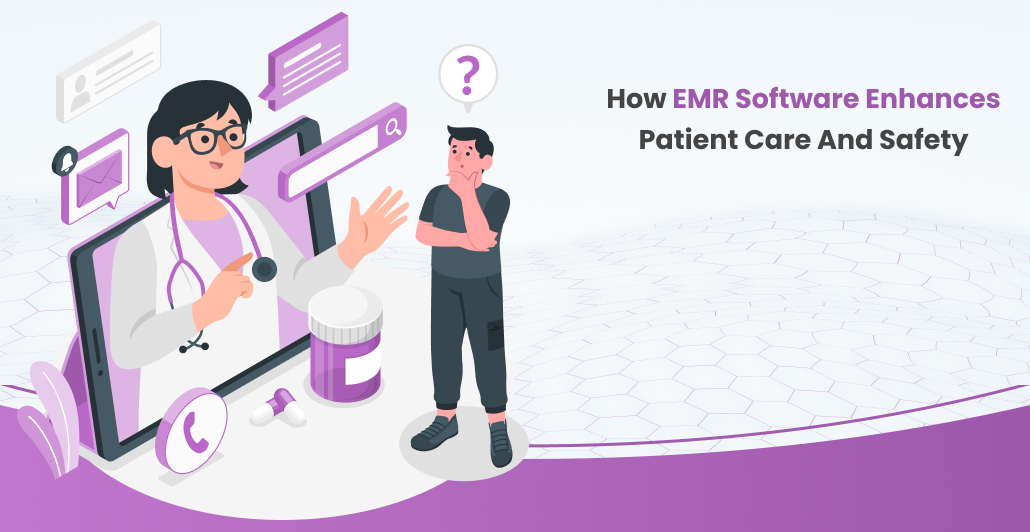
Electronic Medical Record (EMR) software is revolutionizing the healthcare sector by enhancing patient data and efficient health care processes. EMRs give quick, high-quality, and accessible patient data by eliminating the lengthy paper-based process, resulting in quality patient care and protection. Physicians can take decisions, avoid errors, and treat patients quickly with a patient’s entire record at hand in real-time. EMR software also enables better coordination of healthcare teams, provides data protection, and governs compliance. We explain in this paper how EMR software enables better patient safety and care and EMR software modules and advantages in the current healthcare.
What is EMR Software?
Electronic Medical Record (EMR) software is an electronic repository in which health professionals keep, update, and access patients’ medical records. Compared to the traditional paper-based records, EMRs make the patient data come in a format that is easily accessible to trained medical personnel. EMR systems would typically include elements of patient history of recording, diagnosis, medication, plan of treatment, and test results. EMR Software makes practice of health care easier by easing the administrative burden, elimination of errors, and the provision of accurate real-time facts. In addition, EMRs enhance communication among health teams, resulting in better cooperative and effective care of patients.
How EMR Enhances Patient Safety
EMR technology also significantly enhances patient safety because it allows for health care practitioners to have instant access to accurate, real-time patient information related to their ongoing needs. EMR software prevents health care providers from making drug errors since digital prescriptions contain exhaustive patient histories such as allergies and past treatments. Among its key EMR software features are decision support systems, which alert providers to possible issues like drug reaction or abnormal test results so providers can act in a timely manner. EMR software enables healthcare providers to be able to communicate with one another better in an attempt to avoid miscommunication and assist in providing consistent patient care from various providers.Even freeware used for EMR can enable such safety benefits as putting the patients’ data all in one place, making the documentation more complete, and having faster and better access to beneficial information. Such programs becoming a part of the clinical workflow will assist both clinicians and physicians in making patient safety smoother as well as preventing avoidable errors with an easy solution.
EMR Software Modules
EMR software has various important modules which are designed to automate health care operations and enhance patient care. The modules provide health care personnel with timely access to vital patient information securely and efficiently, be it in a clinic, an outpatient facility, or an EMR system hospital environment.
Patient Management
This module deals with patient demographics, appointments and scheduling. It keeps patient information in a clean and easily accessible format. In EMR software what this module accomplishes is at the heart of presenting patients’ entire histories and of streamlining patient flow.
Clinical Documentation
This helps healthcare providers create precise patient records, treatment plans, and follow-up reports. With AI-Powered EMR Software, this module can leverage artificial intelligence to enhance dictation, speed of documentation, and accuracy.
Medication Management
This module offers eRx support to prescribe appropriate drugs and reduce drug prescription errors. The optimal EMR software typically has medication interaction alerts and allergy alerts to maximize patient safety.
Laboratory and Diagnostic
The module integrates lab studies and diagnostic reports with the patient’s history with direct access to important test results for improved clinical decision support.
Billing and Coding
The billing module simplifies coding with automatic application of standard codes for easy insurance reimbursement and medical billing. The module reduces coding errors and speeds up the reimbursement process.
Decision Support System (DSS)
With the support of EMR software with AI, the DSS generates evidence-based recommendations, reminders, and alerts to the clinicians to enhance the quality of care and reduce clinical errors.
With the addition of these modules, EMR systems are capable of enabling efficient workflows, reducing administrative burdens, and enhancing the quality and safety of patient care in any healthcare environment.
Challenges and Solutions for Implementing EMR
The use of EMR systems can inflict tremendous hardship on the health providers.
One of them is the cost of Best EMR software, which may be prohibitive for small practices. In this case, looking for free EMR software substitutes is an absolute reality, although they may provide lower functionality. Another problem is finding EMR software that will work with other health technologies. To this, interoperability-compliant EHR software can enable seamless data sharing between platforms. The EMR software companies can also offer custom options but these fall behind in keeping pace because learning takes time. Offering full training and ongoing support can facilitate transition and usher in user adoption, ultimately resulting in increased use of the EMR system for better patient care.
Conclusion
EMR software is the pinnacle of enhanced patient care, safety, and healthcare effectiveness overall.Through the automation of processes such as patient management, clinical documentation, and medication management, EMR systems increase accuracy, reduce errors, and enhance healthcare provider communication. While cost, interoperability, and adoption are concerns, options such as Free EMR Software, extensive training, and flexible features from EMR software vendors can balance these concerns. With ongoing advancements in technology, utilization of advanced devices like AI-driven EMR software will further streamline patient outcomes and make EMR systems a part of standard healthcare practices today.